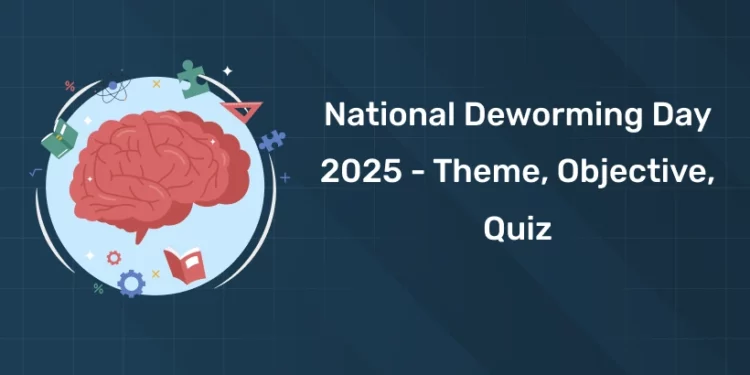Table of Contents
Ministry of Health & Family welfare conducted deworming of children in 277 different districts of 11 different states and Union Territories like Assam and Chhattisgarh. From 2016 onwards, a program aiming and dedicated to deworm children was scaled up to cover all regions of the country. Now National Deworming Day is observed twice a year on February 10th and August 10th all across the nation. The main aim of the day is to eliminate Intestinal worms or Soil-Transmitted Helminths from children of age groups 1- 19. Let’s know some details about National Deworming Day, 2025
Download Entri app to read more such interesting articles
What are Intestinal worms?
Intestinal worms are parasites which are seen in the abdomen of human body which survives by consuming the nutrients that the host consumes. A variety of three intestinal worms are seen in human abdomen where it consumes nutrients from the host and lay thousands of eggs each day.
Impacts and dangers of Intestinal worms on human body
1: Who was the first woman President of India?
Since these parasites reside in the abdomen of the hosts and take up the nutrients from there, there are a number of negatives and health issues it can cause on the human body. Intestinal worms feast from the host body, tissues are damaged which in turn leads to many health issues such as lack of protein and loss of iron from human body. Also, Anaemia is also a common sight in people with intestinal worms as hemoglobin is less. Another health issues caused by Intestinal worms include Diarrhoea, Dysentery, Malnutrition, Loss of appetite, Loss of weight and increased malabsorption.
Free UPSKILLING Courses!
Take your first step toward mastering in-demand skills, acing interviews, and securing top-tier jobs with Entri's free upskilling courses.
Start Learning!Symptoms of intestinal worm infection in humans
Presence of Intestinal worms in the human body can be identified by a number of symptoms. Major symptoms which are commonly seen in humans are weight loss, dysentery, diarrhoea, fatigue, reduced appetite and prevailing abdominal pain. Intestinal worms in children cause intense tiredness and fatigue in them which may result in the inability of attend classes and to do daily chores.
Intestinal worms: Causes and transmission
Soil-Transmitted Helminths (STH) that are commonly called as intestinal worms are transmitted through the eggs in faeces that is deposited in the open environment. Thus the water as well as food sources are contaminated through which the infection spreads later. This transmission is caused due to the lack of proper sanitation facilities, open defecation habits and lack of hygiene.
Intestinal Worm Infection In Indian Children
According to the World Health Organization there are about 24 crore children in India between the age of 1-15 who are affected with Soil-Transmitted Helminths (STH). These statistics shows that India accounts for about 27 percentage of the children globally, who are affected with intestinal worms every year.
Prevention Against Intestinal Worms
-
Deworming using Albendazole Dosage:
Medical vaccination is the most important step in the prevention of intestinal worms. By the suggestion of experts Albendazole tablets are prescribed for vaccination. The dosage of this tablet depends upon the age of the children taking it and this drug is proved to have good results and no side effects.
-
Maintaining Proper Hygiene
Another important preventive measure against worms is maintaining proper hygiene. This includes properly washing the hands before and after eating, using of proper sanitary measures, keeping the surroundings clean and wearing slippers all the time you step outside.
Free UPSKILLING Courses!
Take your first step toward mastering in-demand skills, acing interviews, and securing top-tier jobs with Entri's free upskilling courses.
Start Learning!National Deworming day 2025 Objective
The operational guide issued by the Ministry of Health & Family Welfare, GOI states that the main aim of National Deworming Day is to deworm all the children of age between 1-19 through the platform of schools and anganwadis in order to improve their overall health, nutritional status and the access to a healthy and quality way of life.
National Deworming Day Observation
On February 10th and August 10th, deworming activity is done all over the country by administering of Albendazole tablet to the children through all government and government-aided schools.
In February 2015, the Ministry of Health and Family Welfare constituted NDD in 277 districts of 11 States and Union Territories (UTs) including Assam, Bihar, Karnataka, Tamil Nadu, Chhattisgarh, Dadra and Nagar Haveli, Haryana, Maharashtra, Madhya Pradesh, Rajasthan, and Tripura. In 2016, the NDD, was scaled up to cover all the districts across the country. Since then it is observed twice a year on February 10 and August 10, across the nation.
National Deworming Day Quiz 2025
1. National Deworming Day is being observed on _________ across India
- 10 February
- 12 February
- 13 February
- 11 February
2. Intestinal worms are _________ which are seen in the abdomen of the human body
- Bacteria
- Virus
- Fungus
- Parasites
3. According to WHO, How many children were affected with Soil-Transmitted Helminths (STH)
- 30 Crore
- 10 Lakh
- 24 Crore
- 1 Lakh
4. Which age group get affected with Soil-Transmitted Helminths (STH)
- 1 – 15
- 14 – 19
- 1 – 5
- 2 – 10
5. On ___________, deworming activity is done all over the country
- Feb 10 and Aug 10
- Jan 2
- Feb 10 and July 25
- Mar 27 and Jul 15












